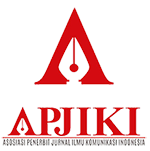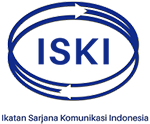EFIKASI DIRI MAHASISWA DALAM PENCARIAN INFORMASI DI WEBSITE PADA PERKULIAHAN ONLINE
Abstract
Keywords
Full Text:
PDFReferences
Case, D. O. (2002). Looking for information: A survey of research on information-seeking, needs and behaviour. San Diego: Elsevier Science.
De Meulemeester, A. (2013). The "Information Literacy Self-efficacy Scale" and the Medical Curricu-lum at Ghent University. Communications in Computer and Information Science. Volume 397 CCIS, pp. 465-470.
Eisingerich, A. B., & Rubera, G. (2010). Drivers of brand commitment: A cross-national investigation. Journal of International Marketing, 18(2), 64-79.
Ellis, David & Oldman, Hanna. (2005). “The English Literature Researcher in the Age of the Internet,” Journal of Information Science 31, no. 1 (2005): 29–36.
Ellis, David. (1993). “Modeling the Information-Seeking Patterns of Academic Researchers: A Grounded Theory Approach,” The Library Quarterly 63, no. 4 (1993): 469–8
Francis, Hannah. (2005). “The Information-Seeking Behavior of Social Faculty at the University of the West Indies, St. Augustine Campus,” Journal of Academic Librarianship 31, no. 1 (Jan. 2005): 67–72.
Ge, Xuemei. (2010). "Information-seeking behavior in the digital age: A multidisciplinary study of academic researchers." College & Research Libraries 71.5 (2010): 435-455.
Haggbloom, S.J. (2002). The 100 most eminent psychologists of the 20th century. Review of General Psychology, 6(2), 139-152.
Internet World Stats (2019). https://internetworldstats.com/top20.htm
Kanjiani. Hariza Hussain. (2021). Relationship between Information Seeking Skills and Research Self-Efficacy of Postgraduate Students. International Journal of Social Sciences: Current and Future Research Trends (IJSSCFRT) (2021) Volume 10, No 1, 36-48
Keshavarz, Amid., Givi, Mohammadreza Esmaeili., & Vafaeian, Amir. (2016). Students' sense of self-efficacy in searching information from the Web: A PLS approach. Webology, Volume 13, Number 2, December, 2016. https://www.webology.org/data-cms/articles/20200515045508pma149.pdf.
Kiliç-Çakmak, E. (2010). Learning strategies and motivational factors predicting information literacy self-efficacy of e-learners. Australasian Journal of Educational Technology, 26(2), 192–208.
Kolbe, Kathy (2009). “Self-efficacy results from exercising control over personal conative strengths", Wisdom of the ages. https://e.kolbe.com/knol/index.html
Koohang, A. (2004). Students' perceptions toward the use of the digital library in weekly web-based distance learning assignments portion of a hybrid programme. British Journal of Educational Technology, 35(5), 617–626.
Kuo, Lily (2014). Four reasons why Indonesia is the world’s most perplexing e-commerce frontier. Situs Quartz. http://qz.com/194656/four-reasons-why-indonesia-is-the-worlds-most-perplexing-e-commerce-frontier/
Kurbanoglu, S. (2003). Self-efficacy: A concept closely linked to information literacy and lifelong learning. Journal of Documentation, 59(3), 635–646.
Lopez-Garrido, Gabriel. (2020). Self-efficacy. Simply Psychology. www.simplypsychology.org/self-efficacy.html
Marchionini, G., & Komlodi, A. (1998). Design of interfaces for information-seeking. Annual Review of Information Science and Technology (ARIST), 33, 89–122.
Nahl, D. (2004). Measuring the affective information environment of web searchers. Proceedings of the 67th ASIS&T Annual Meeting, 41
Nurhayati, Hanadian.-Wolff (2023). Total cases of COVID-19 Indonesia 2023. January 13, 2023. https://www.statista.com/statistics/1103469/indonesia-covid-19-total-cases/
Pensworth, Luke (2020). Internet Statistics, Trends & Data. Daily Wireless. https://dailywireless.org/internet/usage-statistics/#Internet_Usage_Worldwide
Riopel, Leslie. (2022). Measuring Self-Efficacy with Scales and Questionnaires. https://positivepsychology.com/self-efficacy-scales/
Ross, M., Perkins, H., & Bodey, K. (2013). Information literacy self-efficacy: The effect of juggling work and study. Library and Information Science Research, 35, 279-287.
Savolainen, R. (2002). Network competence and information seeking on the Internet: from definitions towards a social cognitive model. Journal of Documentation, 58(2), 211-226.
Sommer, Max., Kohnen, Angela., Ritzhaupt, Albert D., & Hampton, John. (2021). Investigation of the Validity Evidence of the Information Literacy Self-Efficacy Scale (ILSES) Among Undergraduate Students. Communications in Information Literacy. June 2021.
Tang, Yingqi. & Tseng, HungWei. (2013). A Distance Learners' Self-efficacy and Information Literacy Skills. The Journal of Academic Librarianship. 39 (2013) 517–521.
Tuncer, M., & Balci, K. (2013). The research of the effect of computer and information literacy self-efficacy on the achievement of information literacy. Journal of Studies in Education, 3(4).
UNICEF (2021). Indonesia COVID-19 Response Situation Report. April – June 2021. https://www.unicef.org/media/103326/file/Indonesia%20COVID-19%20Situation%20Report,%20June%202021.pdf
World Health Organization. 2020. Coronavirus Disease (CODIV-19). Inhttps://www.who.int/emergencies/diseases/novel-coronavirus-2019/question-and-answers-hub/qa-detail/qa-coronaviruses#:~:text=symptoms
DOI: https://doi.org/10.32509/pustakom.v6i1.2514






